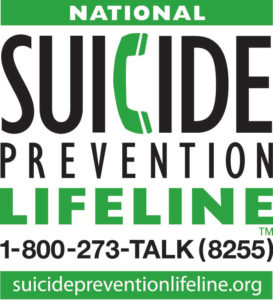Suicide Alert: Spring Can be Deadly
Suicide Rate Spikes in the Spring
Spring is here. That means sunshine, longer days, elevated moods, and an overall feeling of happiness. After all, “springtime” refers to the season, and also to thoughts of rebirth, regrowth, rejuvenation, and renewal. The birds chirp, creatures come out of hibernation, flowers bloom, and the earth seems to come to life again. Spring tends to make people feel happy, energetic and alive. For many of us, Spring awakens the senses. However, anyone suffering from depression, grief, post-traumatic stress disorder (PTSD) and/or anxiety may actually feel worse.
Suffering from Depression, Grief or PTSD?
 For someone suffering from mental health issues, it will take much more than some nice weather or birdsong to feel better. In the wintertime, it is easier for anyone grappling with a mental health issue to chalk it up to the “winter blues” or seasonal affective disorder (SAD) and to expect to feel better once Spring arrives. However, it can feel quite isolating when spring does arrive yet feelings of sadness and despair linger, while everyone else seemingly has “spring fever”.
For someone suffering from mental health issues, it will take much more than some nice weather or birdsong to feel better. In the wintertime, it is easier for anyone grappling with a mental health issue to chalk it up to the “winter blues” or seasonal affective disorder (SAD) and to expect to feel better once Spring arrives. However, it can feel quite isolating when spring does arrive yet feelings of sadness and despair linger, while everyone else seemingly has “spring fever”.
 If you or someone you know might be suffering from depression or having suicidal thoughts, the National Suicide Prevention Lifeline can help. Call 800-273-TALK (8255). The 24/7 toll free hotline is available to anyone in suicide crisis or emotional distress. Trained volunteers connect with those suffering and offer emotional support and guidance for help.
If you or someone you know might be suffering from depression or having suicidal thoughts, the National Suicide Prevention Lifeline can help. Call 800-273-TALK (8255). The 24/7 toll free hotline is available to anyone in suicide crisis or emotional distress. Trained volunteers connect with those suffering and offer emotional support and guidance for help.
Suicide – A Leading Cause of Death in the US, and on the Rise
According to Centers for Disease Control and Prevention suicide rates in the U.S. have risen nearly 30% since 1999. Nearly half of people who died by suicide had a known mental health condition. Although there are many groups at risk, middle-age adults had the highest increase. Fitting this statistic is the recent death of Alan Krueger, Princeton University economist and top adviser to Presidents Bill Clinton and Barack Obama — as well as the last year’s deaths by suicide of fashion designer Kate Spade and celebrity chef Anthony Bourdain.
News coverage of recent celebrity suicides has increased awareness on a growing crisis that claims the lives of nearly 50,000 people in the U.S each year. Last years, calls to the National Suicide Prevention Lifeline spiked 25% since the reported suicides of Anthony Bourdain and Kate Spade.
However while increasing awareness is positive, Mental health professionals agree that high-profile celebrity suicides could possibly lead to “suicide contagion”, and that we should all be aware of the risk factors and what to do if we believe someone is in crisis.
 If you or someone you know might be suffering from depression or having suicidal thoughts, the National Suicide Prevention Lifeline can help. Call 800-273-TALK (8255). The 24/7 toll free hotline is available to anyone in suicide crisis or emotional distress. Trained volunteers connect with those suffering and offer emotional support and guidance for help.
If you or someone you know might be suffering from depression or having suicidal thoughts, the National Suicide Prevention Lifeline can help. Call 800-273-TALK (8255). The 24/7 toll free hotline is available to anyone in suicide crisis or emotional distress. Trained volunteers connect with those suffering and offer emotional support and guidance for help.
If you are experiencing symptoms of depression, such as despair, trouble sleeping, lack of appetite, feelings of worthlessness and/or hopelessness, lack of motivation, feelings of isolation, no longer enjoying activities that you used to enjoy, or thoughts of suicide, especially if you suffer from mental health issues or have suffered a concussion or other brain injury at any point in your life, contact Dr. Diane®. There is help and hope through our 5 Prong Approach of Integrative Therapy.
Suggested Treatment Methods
Psychopharmacology:
Symptoms of depression, especially those that bring about suicidal thoughts, tend to improve when traditional psychotherapy and cognitive behavioral therapy are used alongside appropriate medications. A psychopharmacologist (a psychiatrist who specializes in using drugs to treat psychiatric disorders) can work with you to determine which medications and dosages would be best for you.
Psychotherapy:
Psychotherapy, also known as “talk therapy”, is one of the most common and effective treatments for psychiatric disorders, especially those that cause thoughts of suicide. Psychotherapy includes techniques to increase awareness, within your choices of thought, feeling or action. Psychotherapy can increase the sense of well-being and can better manage discomfort or distress. Psychotherapy is very effective in decreasing suicidal thoughts, especially when used in conjunction with psychopharmacology.
Biofeedback and Neurofeedback:
Biofeedback is a form of behavioral medicine that utilizes information gained by monitoring skin temperature, blood pressure, heart rate, and other body conditions to encourage control over the normally involuntary nervous system through conditioning and relaxation.
CES Machine:
CES (Cranial Electrotherapy Stimulation), is an FDA approved device to treat depression, anxiety and insomnia. It quiets the over-stimulated (reactivity) of the area of the brain (Limbic System), where the symptoms of anxiety, sleep problems, depression, and chronic pain are focused. If you are interested in purchasing a CES device, please visit our online store.
Massage:
Massage Therapy is a relaxing and rejuvenating treatment, especially when you are experiencing symptoms of depression. Massage reduces tension in all parts of the body, promoting better sleep and greater overall well-being.
Nutrition Education:
A balanced diet is not only necessary for optimal body function, but is crucial for optimal brain function as well. Eating foods that are not beneficial for your brain, such as sugar and alcohol, keep your brain from working at its best possible level and may affect your moods. Proper diet, including brain healthy foods, may alleviate symptoms of depression, especially if you have had a traumatic brain injury, such as a concussion, stroke, or aneurysm. We can work with you to create a custom, brain-healthy diet.
Acupuncture:
Acupuncture is a complementary approach used in traditional Chinese Medicine. Acupuncture, like all energy healing methods, uses the body’s own qi (natural energy flow) to restore the body’s natural energy balance.
Reiki:
Reiki is a method of energy healing that is currently practiced all over the world and gaining in popularity. Reiki utilizes a natural universal energy that helps to balance the client’s system and assists healing at all levels. Because it is relaxing and supports the healing process, it can help treat a wide variety of issues, such as depression. Reiki is also effective for stress reduction, for increasing overall vitality, and for treating injuries.
Bach Flower Remedies:
Dr. Bach discovered that certain flowers emit frequencies that effect specific symptoms, such as anxiety (remedy: Aspen) or racing thoughts (remedy: White Chestnut), and known fears (remedy: Mimulus). From his training in homeopathy he discovered that each of the 38 flowers essences, which are the frequencies, match specific symptoms. It is important to work with a Bach Flower Practitioner, such as Dr. Diane®, to create a customized Bach Flower treatment plan for your specific symptoms.
To learn more about how these methods can help alleviate your symptoms of depression, contact us, or schedule a consultation with Dr. Diane®.
Other Suggested Methods
- If you or a loved one have had suicidal thoughts or are in crisis, please call 1-800-273-TALK (8255), National Suicide Prevention Lifeline
- Join a self-help or support group through your local hospital or community mental health center.
- Participate in group therapy with an understanding mental health professional.
- Seek online one-to-one support through forums, chats, or online bulletin boards.
- Find a support group through the National Alliance on Mental Illness (NAMI).
- HelpGuide.org
Stop Hurting Today. There is Help and Hope.
If you have suffered a traumatic brain injury, including a concussion, stroke, or aneurysm, at any point in your life, you may also be experiencing symptoms of PCS (Post Concussion Syndrome). PCS may heighten pre-existing conditions, especially depression. Dr. Diane® can help! Schedule a consult or call 800-500-9971.
Please use the share buttons at the left of this page (bottom of your screen on mobile devices) if you think this can make a difference in someone’s life! Thank you.
There is a Way!™
– Dr. Diane®


